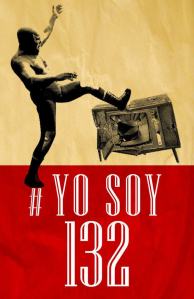The image above is taken from Paul Baran’s 1964 paper on distributed communications. Together with Gilles Deleuze and Félix Guattari’s rhizome, it provides me with an analogical model for viral politics
 WELCOME TO MY WEBPAGE
WELCOME TO MY WEBPAGE
I am a political theorist at the National University of Mexico (UNAM). My work is informed by Continental thought and my recent research and publications have focused on various aspects of post-liberal politics. I am currently looking at Occupy Wall Street, the Spanish indignados, the Mexican #YoSoy132 movement and other forms of viral politics. This is part of an ongoing research on the becoming-other of politics. You can contact me at barditi@unam.mx
Here you will find information about my publications and how to download some of my articles. You will also find links to journals, conferences and author resources online as well as information about Taking on the Political, the book series on Continental political thought I edit together with Jeremy Valentine, Alex Thomson and Andrew Schaap for Edinburgh University Press.
 Insurgencies don’t have a plan —they are the plan. Political performatives and vanishing mediators in 2011 (Journalism, Media and Cultural Studies 2012 download here, Debate Feminista 2012 descargar aquí). 2011 turned out to be an extraordinary year. The clustering of insurgencies around time and geography gave a political ring to the seasons: commentators spoke of the Arab Spring, the European Summer and the US Fall. TIME magazine even named “the protester” person of the year. Yet many faulted these revolts for their lack of plans and proposals. I disagree. Their criticism misses the point by confusing the disruption of the given with the task of reconfiguring it. Insurgencies are not standard political practices or policy-making exercises. They are about saying “enough!”, refusing to go on as before and opening up possibilities that may or may not prosper. Insurgencies are the plan in a three-fold sense: they make a difference by moving the conversation, they are political performatives —participants start to experience what they strive to become— and they function as vanishing mediators or passageways to something other to come. These three points will reappear in a discussion about the material remainder of two insurgencies: the Arab Spring and the student mobilizations in Chile.
Insurgencies don’t have a plan —they are the plan. Political performatives and vanishing mediators in 2011 (Journalism, Media and Cultural Studies 2012 download here, Debate Feminista 2012 descargar aquí). 2011 turned out to be an extraordinary year. The clustering of insurgencies around time and geography gave a political ring to the seasons: commentators spoke of the Arab Spring, the European Summer and the US Fall. TIME magazine even named “the protester” person of the year. Yet many faulted these revolts for their lack of plans and proposals. I disagree. Their criticism misses the point by confusing the disruption of the given with the task of reconfiguring it. Insurgencies are not standard political practices or policy-making exercises. They are about saying “enough!”, refusing to go on as before and opening up possibilities that may or may not prosper. Insurgencies are the plan in a three-fold sense: they make a difference by moving the conversation, they are political performatives —participants start to experience what they strive to become— and they function as vanishing mediators or passageways to something other to come. These three points will reappear in a discussion about the material remainder of two insurgencies: the Arab Spring and the student mobilizations in Chile.

Politics on the Edges of Liberalism. Difference, Populism, Revolution, Agitation
Edinburgh University Press, 2007
Read more about it by clicking Politics on the Edges.

Liberalizmin Kiyilarinda Siyaset: Farklilik, Popülizm, Devrim, Ajitasyon
Benjamin Arditi, Metis, Istambul 2010.
Find out more about the Turkish translation by clicking here.

La política en los bordes del liberalismo. Diferencia, populismo, revolución, emancipación
Benjamin Arditi, Gedisa, Barcelona 2010
Para más información sobre la traducción al español haga click aquí.
 ¿Democracia post-liberal? El espacio político de las asociaciones, Benjamin Arditi (ed.), Anthropos, Barcelona, 2005.
¿Democracia post-liberal? El espacio político de las asociaciones, Benjamin Arditi (ed.), Anthropos, Barcelona, 2005.
The essays in this volume discuss Offe’s work on organized interest groups and Schmitter’s proposal to fund social organizations with public monies in order to assess whether we can speak of a second circuit of politics as a symptom of our post-liberal scenario of democratic politics. You can look at the ToC and the intro by clicking on Post-Liberal Democracy.

Hey there this is somewhat of off topic but I was wondering if blogs use WYSIWYG editors or if you have to manually code with HTML. I’m starting a blog soon but have no coding knowledge so I wanted to get guidance from someone with experience. Any help would be enormously appreciated!
The beauty of WP, Wix and many other free sites is that you don’t need any programming. Its very easy to use.